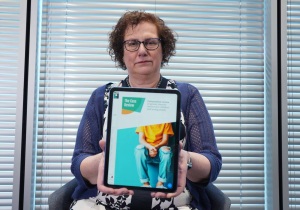(This item first appeared in the Brighton Argus on 1st May 2024)
It takes some courage, in one’s mid-40s, to go to university. It takes some attitude to then get involved in student politics. And it takes someone of extraordinary ability and personality to become the oldest person to be elected as President of the Students’ Union. But then Valerie Mainstone was, and still is, a one-off.

Valerie Mainstone (front) at the unveiling of a blue plaque in Montpelier Crescent for Elizabeth Robins and Octavia Wilberforce
Forty years later, Valerie continues to make her mark and be noticed. In our society, women, especially those who are retired, can become invisible. But not Valerie. At just under five feet tall, she stands out from the crowd, including at women’s events and public occasions such as the recent unveiling of the plaque in St Michael’s Place, Brighton, to commemorate the life of Mary Hare (the pioneering teacher of deaf children and campaigner for women’s right to vote). Valerie, as is her custom on such occasions, wore a suffragette outfit.
Now in her mid-80s, she does not stop, campaigning for the NHS, in the peace movement through the Women’s International League for Peace and Freedom, and as a founder member of the Brighton Women’s History Group. So who is this remarkable woman?
Born in Edinburgh in 1941, she and her family moved to Southwick when her father was posted overseas during the war. An early memory was of standing on the one part of the beach at Southwick that hadn’t been closed and fortified to hinder a German invasion. Looking out across the Channel, she said to herself that one day she would go to France. The war itself was to have a lasting impact on her. Even today she can’t stand the sound of police or ambulance sirens. “It chills me to the bone”, she told me.
Valerie, her youngest sister and her Mainstone cousins have inherited a mutation of the BRCA1 gene, a condition which affects more women than men in her family. The BRCA1 gene protects one from getting certain cancers, but some mutations prevents them from working properly. If you inherit one of these mutations, you are more likely to get breast, ovarian, and other cancers. She speaks of her huge relief that she did not pass on the mutations to her son and daughter, and so her four granddaughters and two great-grandsons are free from this particular risk.
Valerie did well at school but had her mind set on getting married, which she did at 19 much to her mother’s disgust. She worked as a shorthand typist for the Federation of British Industries where her fluency in French and German saw her working with the Oversees Director of the Federation. It was at the Federation that she met people who had been members of the French Resistance during the war, thus deepening her Francophile tendencies that started on that beach in Southwick.
She worked at a local dairy where, she says, sexual harassment was endemic. It reenforced her belief in union membership. A Workers’ Education Association course was the start of her academic aspirations.
When she divorced her husband in the early 1980s, she enrolled as a mature student at the University of Sussex studying European History with French. Her year abroad was in Marseilles where she researched and wrote her dissertation ‘Professional Equality of Women in the Sugar Refinery In Marseilles’ for which she won the prestigious Peggotty Freeman Memorial Prize for the Best Year Abroad Dissertation. And it was at Sussex University that she was elected as President of the Students’ Union which is where I first met her, even though I was not a student.
After graduation she worked for Women Against Sexual Harassment where she continued her advocacy work and gave talks at schools, universities and workplaces. She spoke at a conference in Paris on the fight against sexual harassment, surprising the organisers by delivering her speech in fluent French.
Today she remains as active as ever. Her diary is much busier than mine, as I discovered when we tried to find time to meet. After our meeting, she had to dash off to a demonstration outside Hove Town Hall. In the previous fortnight I had seen her at an event where she was dressed as a suffragette, and at the International Women’s Day event at the Corn Exchange where she spent time staffing three stalls, for Sussex Save the NHS, the Brighton Women’s History Group, and the Mary Clarke Statue Appeal.
Many people do their bit to make this world a better place. By comparison, Valerie’s activism is that of a colossus.


